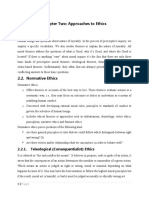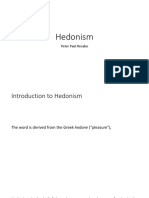CHAPTER 6:
PLEASURE
Hedonism
Picks egoistic pleasure as man’s highest good. It need not to be the pleasure of the
moment or sensuous pleasure only, but can be a wise blend of enjoyments spread out
over one’s probable lifetime.
It is the view that our fundamental moral obligation is to maximize pleasure or
happiness.
First proposed by Aristippus, leader of Cyrenaic school, who identified happiness in
pleasure.
According to him, pleasure results from gentle motion and pain from rough
motion.
Refined by Epicurus.
For him, the end of life is not intense pleasure, but an abiding peace of mind, a
state of cheerful tranquility.
At its simplest, hedonism is the claim that all and only pleasure has positive importance
and all and only pain or displeasure has negative importance.
Examples:
If you’ve ever eaten too much candy at one time, you know how this works. You
may enjoy the candy at the time, but soon after you get a terrible stomachache,
and in the long run, your teeth will rot away.
an ethical theory suggesting the pursuit of pleasure should be the ultimate goal
a constant quest for pleasure and satisfaction
Types of Hedonism
1. Egoistic Hedonism
Concentrates on personal pleasure
The theory that we ought, morally speaking, to do whatever makes us happiest – that is
whatever provides us with the most net pleasure after pain is subtracted.
Example:
a Hedonistic Egoist who did not feel saddened by theft would be morally required
to steal, even from needy orphans (if he thought he could get away with it)
2. Altruistic Hedonism
Seeks the pleasure of others
The creation of pleasure for all people is the best way to measure if an action is ethical.
Example:
� giving your lunch away is altruistic because it helps someone who is hungry, but
at a cost of being hungry yourself
Arguments for:
- We do in fact seek pleasure and shun, even duty affords a kind of intellectual
satisfaction, altruistic behavior has a self-regarding aspect, and those who seek a
reward in the next world expect to enjoy it.
Arguments against:
- We often refuse pleasure for higher motives, satisfaction in doing one’s duty is not
the same as pleasure, enlightened self-interest is not our only motive, and those who
would not do good unless it were rewarded are unworthy of the reward.
Utililitarianism
Refers to the altruistic pleasure of seeking the greatest happiness of the greatest number,
and measures the morality of an act by its utility in promoting the common welfare.
The extension of hedonism beyond the pleasure of the individual to the pleasure of the
group.
Theory which assumes that the rightness of an action depends entirely on the amount of
pleasure it tends to produce and the amount of pain it tends to prevent.
Jeremy Bentham considered only quantity of pleasure while John Stuart Mill considered
both quantity and quality of pleasure. Both thought that the moral value of an act was
determined by the pleasure it produced.
Bentham thought that units of pleasure and pain can be calculated arithmetically and that
ethics can be made into an exact science, Mill recognized that pleasures differ in quality
as well in quantity, that there are higher and lower pleasures, so that a lesser amount of
higher pleasure is better than a greater amount of a lower pleasure, the determination to
be made by a man culture who can experience both.
Often considered fairer than Hedonistic Egoism because the happiness of everyone
involved (everyone who is affected or likely to be affected) is taken into account and
given equal weight.
Nature of Utilitarianism
Utilitarianism is an effort to provide an answer to the practical question “What ought a
person to do?” The answer is that a person ought to act so as to maximize happiness or
pleasure and to minimize unhappiness or pain.
Example:
A Hedonistic Utilitarian would be morally obliged to publicly execute an innocent
friend of theirs if doing so was the only way to promote the greatest happiness
� overall. Although unlikely, such a situation might arise if a child was murdered in
a small town and the lack of suspects was causing large-scale inter-ethnic
violence.
Arguments for:
- It seeks other’s happiness as well as one’s own, it recognizes man’s social needs, it
curbs man’s selfish greed, it accepts qualitative differences in pleasures, and it is open
both to virtue and to religion.
Arguments against:
- It gives no reason why one should consider others, it cannot determine what makes
for the general happiness, it should logically eliminate sufferers, it has no place for
real love, and it makes the noblest acts not good in themselves but only useful means.
The Place of Pleasure in the Good Life
Pleasure is always good and never bad. If a pleasure can ever be called bad it is not
because the pleasing object is pleasant, but because it has other features connected with it
that are harmful or unworthy.
Example:
Violating others’ rights
Stunting one’s personality
The pleasure of this life are not attainable by all men at all times. To have some pleasures
we must forego others.
Pleasure fails as the highest good, yet it is a very important good. It is a stimulus that
nature uses to allure us to the proper use of our abilities. It is also a subjective experience
sought for its own sake. There is nothing wrong in seeking pleasure for itself, so long as
it is kept within proper bounds and not too much is expected of it. A puritanical attitude
toward pleasure is not praiseworthy.
“Pleasure is a good, but not the good.”























































































